(完整word版)牛津上海八下8BUnit7Poems知识点梳理,推荐文档
- 格式:doc
- 大小:66.52 KB
- 文档页数:4
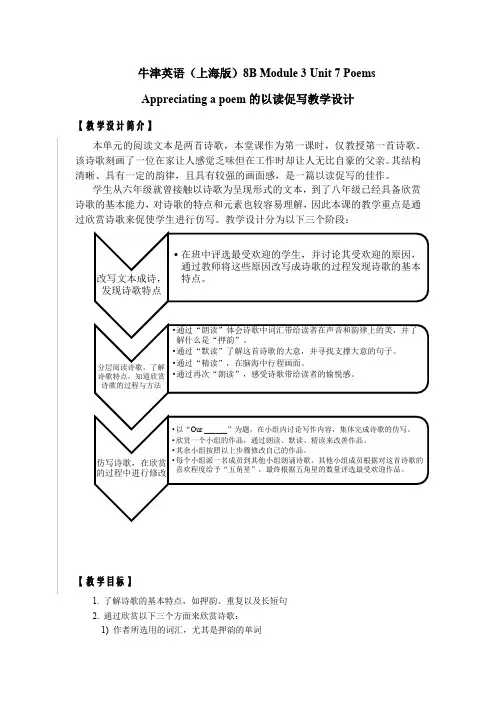
牛津英语(上海版)8B Module 3 Unit 7 PoemsAppreciating a poem的以读促写教学设计【教学设计简介】本单元的阅读文本是两首诗歌,本堂课作为第一课时,仅教授第一首诗歌。
该诗歌刻画了一位在家让人感觉乏味但在工作时却让人无比自豪的父亲。
其结构清晰、具有一定的韵律,且具有较强的画面感,是一篇以读促写的佳作。
学生从六年级就曾接触以诗歌为呈现形式的文本,到了八年级已经具备欣赏诗歌的基本能力,对诗歌的特点和元素也较容易理解,因此本课的教学重点是通过欣赏诗歌来促使学生进行仿写。
教学设计分为以下三个阶段:【教学目标】1. 了解诗歌的基本特点,如押韵、重复以及长短句2. 通过欣赏以下三个方面来欣赏诗歌:1) 作者所选用的词汇,尤其是押韵的单词2) 每一段诗节想表达的主旨是否有足够的支撑句3) 每一句诗句在脑海中所产生的画面3. 仿写课本诗歌,并利用上述三个欣赏诗歌的方法改善作品【教学重点及学习难点】教学重点:引导学生在学会欣赏诗歌的基本方法后仿写,并进行一定的润色学习难点:在尝试诗歌仿写过程中融入诗歌特点【教学过程】一、教师首先在黑板上靠近顶部写上The most popular student in my class,然后问‘Who is the most popular student in my class?’,在得到呼声最高的名字后,教师在黑板靠近底部写上‘______ is the most popular student in my class.’,并问‘Why do you think so?’,让学生说出至少支撑这个观点的若干原因,并逐条将其写在‘______ is the most popular student in my class.’上方。
The most popular student in my classJack is kind and helpful. He always helps his classmates. He also helps his teachers. He does well in all subjects and he is good at playing the piano. Jack is the most popular student in my class.二、教师将上面这篇短文迅速改写为诗歌形式,并写在短文的右边,让学生能清晰地看到短文和诗歌在形式的差别,然后问‘What is it?’,学生回答‘It’s a poem.’。
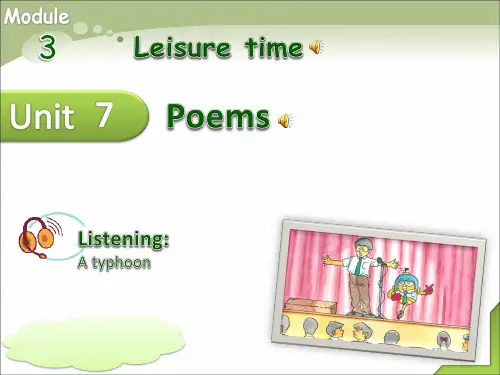
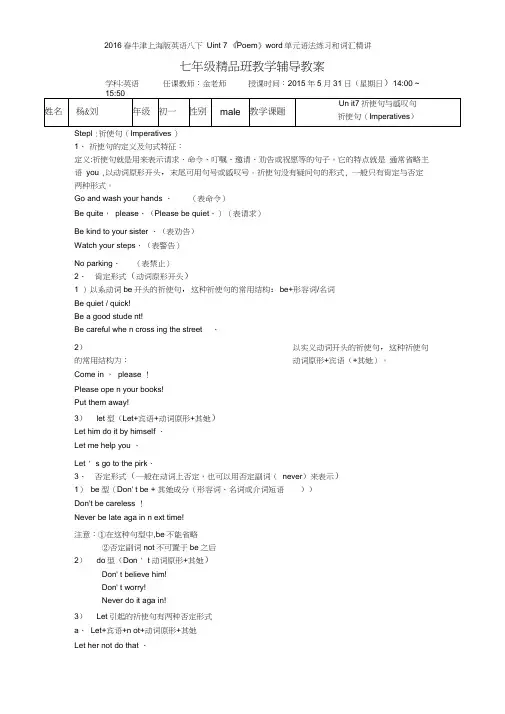
2016春牛津上海版英语八下Uint 7《Poem》word单元语法练习和词汇精讲七年级精品班教学辅导教案学科:英语任课教师:金老师授课时间:2015年5月31日(星期日)14:00 ~Stepl :祈使句(Imperatives )1、祈使句的定义及句式特征:定义:祈使句就是用来表示请求、命令、叮嘱、邀请、劝告或祝愿等的句子。
它的特点就是通常省略主语you ,以动词原形开头,末尾可用句号或感叹号。
祈使句没有疑问句的形式, 一般只有肯定与否定两种形式。
Go and wash your hands 、(表命令)Be quite,please、(Please be quiet、)(表请求)Be kind to your sister 、(表劝告)Watch your steps、(表警告)No parking、(表禁止)2、肯定形式(动词原形开头)1 )以系动词be开头的祈使句,这种祈使句的常用结构:be+形容词/名词Be quiet / quick!Be a good stude nt!Be careful whe n cross ing the street 、2)以实义动词开头的祈使句,这种祈使句的常用结构为:动词原形+宾语(+其她)。
Come in ,please !Please ope n your books!Put them away!3)let型(Let+宾语+动词原形+其她)Let him do it by himself 、Let me help you 、Let ' s go to the pirk、3、否定形式(一般在动词上否定,也可以用否定副词(never)来表示)1)be型(Don' t be + 其她成分(形容词、名词或介词短语))Don't be careless !Never be late aga in n ext time!注意:①在这种句型中,be不能省略②否定副词not不可置于be之后2)do型(Don ' t动词原形+其她)Don' t believe him!Don' t worry!Never do it aga in!3)Let引起的祈使句有两种否定形式a、Let+宾语+n ot+动词原形+其她Let her not do that 、Let ' s not think about it、It ' s only a waste of time b、Don' t+ let+宾语+动词原形+其她Don' t let Jim do that、Don' t let us go, please4)在公共场合的提示语中,否定祈使句常用 事"。
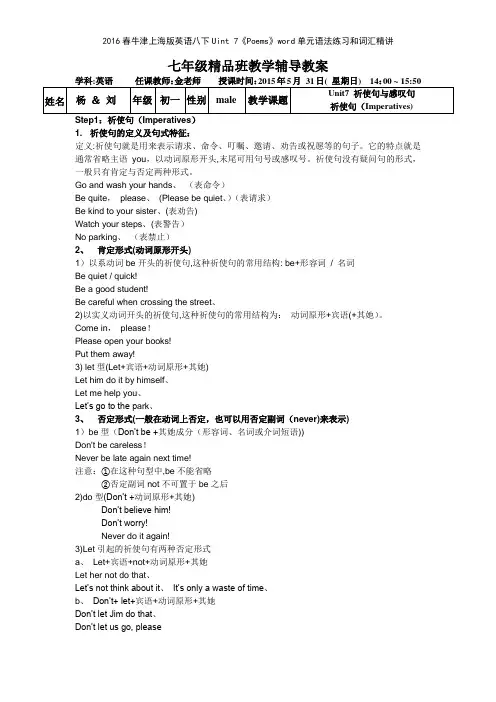
七年级精品班教学辅导教案Step1:祈使句(Imperatives)1. 祈使句的定义及句式特征:定义:祈使句就是用来表示请求、命令、叮嘱、邀请、劝告或祝愿等的句子。
它的特点就是通常省略主语you,以动词原形开头,末尾可用句号或感叹号。
祈使句没有疑问句的形式,一般只有肯定与否定两种形式。
Go and wash your hands、(表命令)Be quite,please、(Please be quiet、)(表请求)Be kind to your sister、(表劝告)Watch your steps、(表警告)No parking、(表禁止)2、肯定形式(动词原形开头)1)以系动词be开头的祈使句,这种祈使句的常用结构: be+形容词/ 名词Be quiet / quick!Be a good student!Be careful when crossing the street、2)以实义动词开头的祈使句,这种祈使句的常用结构为:动词原形+宾语(+其她)。
Come in,please!Please open your books!Put them away!3) let型(Let+宾语+动词原形+其她)Let him do it by himself、Let me help you、Let’s go to the p ark、3、否定形式(一般在动词上否定,也可以用否定副词(never)来表示)1)be型(Don’t be +其她成分(形容词、名词或介词短语))Don't be careless!Never be late again next time!注意:①在这种句型中,be不能省略②否定副词not不可置于be之后2)do型(Don’t +动词原形+其她)Don’t believe him!Don’t worry!Never do it again!3)Let引起的祈使句有两种否定形式a、Let+宾语+not+动词原形+其她Let her not do that、Let’s not think about it、It’s only a waste of time、b、Don’t+ let+宾语+动词原形+其她Don’t let Jim do that、Don’t let us go, please4) 在公共场合的提示语中,否定祈使句常用“No+名词/ V—ing形式"结构,表示“禁止做某事"。
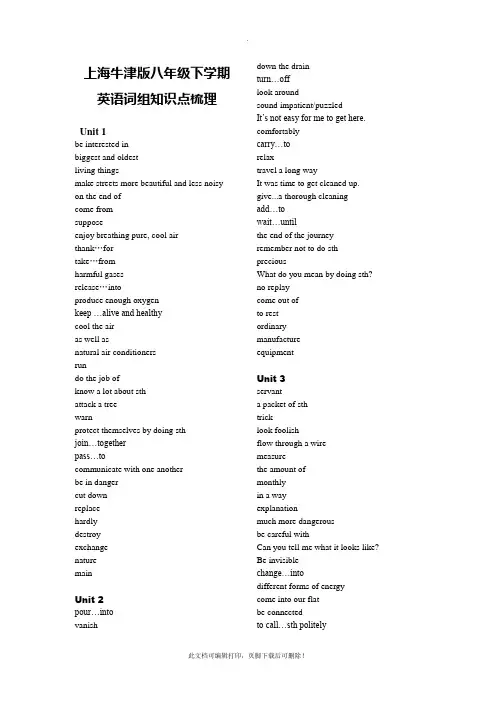
上海牛津版八年级下学期英语词组知识点梳理Unit 1be interested inbiggest and oldestliving thingsmake streets more beautiful and less noisy on the end ofcome fromsupposeenjoy breathing pure, cool airthank…fortake…fromharmful gasesrelease…intoproduce enough oxygenkeep …alive and healthycool the airas well asnatural air conditionersrundo the job ofknow a lot about sthattack a treewarnprotect themselves by doing sth join…togetherpass…tocommunicate with one anotherbe in dangercut downreplacehardlydestroyexchangenaturemainUnit 2pour…intovanish down the drainturn…offlook aroundsound impatient/puzzledIt’s not easy for me to get here. comfortablycarry…torelaxtravel a long wayIt was time to get cleaned up. give...a thorough cleaning add…towait…untilthe end of the journey remember not to do sthpreciousWhat do you mean by doing sth? no replaycome out ofto restordinarymanufactureequipmentUnit 3servanta packet of sthtricklook foolishflow through a wiremeasurethe amount ofmonthlyin a wayexplanationmuch more dangerousbe careful withCan you tell me what it looks like? Be invisiblechange…intodifferent forms of energycome into our flatbe connectedto call…sth politelycontainproduceswitch offlockencouragebehavepolitecustomerUnit 4hold a meeting/be at the meeting decide to do sththe chief editorsuggest that sb (should) do sth vote forelect sb. to betake charge ofought to do sthask for suggestionhave experiencebe secretary oftake notesthe other threebe responsible fortalk…overamongmake a list of sthpublish the paperbe free to pay for sthconsiderbrieflyask whether…have an ideathink about…a bit longermake a decision aboutagree to do sthconcludearrange to do sthin one week’s timeagree onin alltalentgather delightedshamedesigncomplainUnit 5belong toas soon aswalk into someplacebook a roomYou’re welcome.allowsound like…interruptat oncebothlead sb.Personally to…before doing sththe location of the fireexitsafetydescribe sth to sbin one own wordsbe asleepsmell smokego offmust be outsidethe phone was deadalonglay on the floorbesideseem likemoments later/seconds later be safesave one’s lifelendtake caremindlook outwatch outUnit 61. now that: since2. be behind sb3. think about doing sth.4. go abroad国外/ aboard5. why not do sth/Why don’t sb. do sth.6. spread one’s wings7. one of the most popular tourist destinations8. such as / fore example9. wide, tree-lined streets10. the same size as / as big as11. attractions / attractive12. an hour away from/ how far13. the center of Paris14. offer to do sth.15. go on to do sth./ go on doing sth.16. do it without doing sth17. enable…to / be able to do sth. /ability (n.)18. travel…from…to…19. grow crops20. make + adj./ make sb. do sth21. excellent : very good22. used to do sth. 过去常常做某事/ be used to doing习惯于做某23. be famous for24. the influence of ./ have an influence on25. in some way 26. provide sb. for sth./ provide sth. for sb.27. a leader in art and culture ( led- leading)28. a lot of young students from differentcountries go to France29. to further one’s study (why?)30. film festivals, exhibitions and concerts31. throughout the world/all over the world Unit 71. be at home/ be at work2. a boring man/ make me bored3. on the site4. walk on a narrow plank5. scared/scary6. on one’s own: by oneself7. be pleased with (pleasing, pleasure, pleasant)8. be cross/ angry9. pay attention to10. scold sb 11. put sb in detention 12. help sb in every way13. love chatting with sb (talk with)14. be puzzled by sth (puzzling)15. Pretend to do sth.16. concern about17. accept - acceptable18. express -expression19. honest- honesty-dishonest20.patient-patience-impatient-patiently -impatiently。
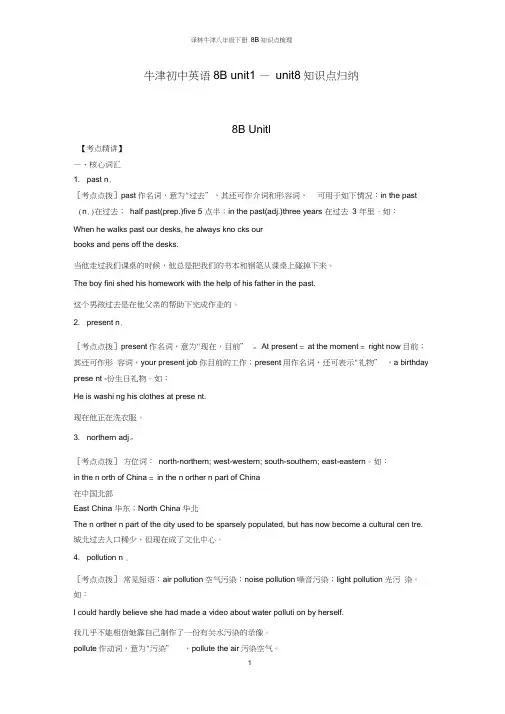
牛津初中英语8B unit1 —unit8知识点归纳8B Unitl【考点精讲】—、核心词汇1. past n.[考点点拨]past作名词,意为"过去”,其还可作介词和形容词,可用于如下情况:in the past (n.)在过去;half past(prep.)five 5 点半;in the past(adj.)three years 在过去 3 年里。
如:When he walks past our desks, he always kno cks ourbooks and pens off the desks.当他走过我们课桌的时候,他总是把我们的书本和钢笔从课桌上碰掉下来。
The boy fini shed his homework with the help of his father in the past.这个男孩过去是在他父亲的帮助下完成作业的。
2. present n.[考点点拨]present作名词,意为"现在,目前” 。
At present = at the moment = right now目前;其还可作形容词,your present job你目前的工作;present用作名词,还可表示"礼物” ,a birthday prese nt -份生日礼物。
如:He is washi ng his clothes at prese nt.现在他正在洗衣服。
3. northern adj。
[考点点拨]方位词:north-northern; west-western; south-southern; east-eastern。
如:in the n orth of China = in the n orther n part of China在中国北部East China 华东;North China 华北The n orther n part of the city used to be sparsely populated, but has now become a cultural cen tre. 城北过去人口稀少,但现在成了文化中心。
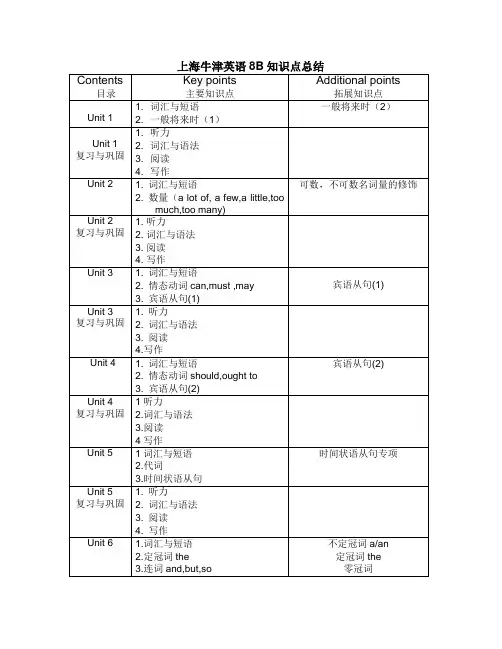
上海牛津英语8B知识点总结Contents目录Key points主要知识点Additional points拓展知识点Unit 1 1. 词汇与短语2. 一般将来时(1)一般将来时(2)Unit 1 复习与巩固1. 听力2. 词汇与语法3. 阅读4. 写作Unit 2 1. 词汇与短语2. 数量(a lot of, a few,a little,toomuch,too many)可数,不可数名词量的修饰Unit 2 复习与巩固1. 听力2. 词汇与语法3. 阅读4. 写作Unit 3 1. 词汇与短语2. 情态动词can,must ,may3. 宾语从句(1)宾语从句(1)Unit 3 复习与巩固1. 听力2. 词汇与语法3. 阅读4.写作Unit 4 1. 词汇与短语2. 情态动词should,ought to3. 宾语从句(2)宾语从句(2)Unit 4 复习与巩固1听力2.词汇与语法3.阅读4写作Unit 5 1词汇与短语2.代词3.时间状语从句时间状语从句专项Unit 5 复习与巩固1. 听力2. 词汇与语法3. 阅读4. 写作Unit 6 1.词汇与短语2.定冠词the3.连词and,but,so 不定冠词a/an 定冠词the零冠词Unit 6 复习与巩固1. 听力2. 词汇与语法3. 阅读4. 写作Unit 7 1词汇与短语2.who和whose3.名词性物主代词3.one和ones.形容词性、名词性物主代词Unit 7 复习与巩固1. 听力2. 词汇与语法3. 阅读4. 写作动词的各种时态1.一般现在时2.现在进行时3.一般过去时4.过去进行时5.一般将来时时态之间的比较与区别1.一般过去时2.现在完成时3.过去完成时现在完成时与一般过去时的区别;现在完成时与过去完成时的区别状语从句补充1.条件状语从句if,though2.原因状语从句Because,for,since3.结果状语从句So(such)....that4.目的状语从句So that单项选择强化训练全面巩固本学期所学基础知识点首字母强化训练启发思维体会技巧阅读理解强化训练掌握策略熟能生巧。
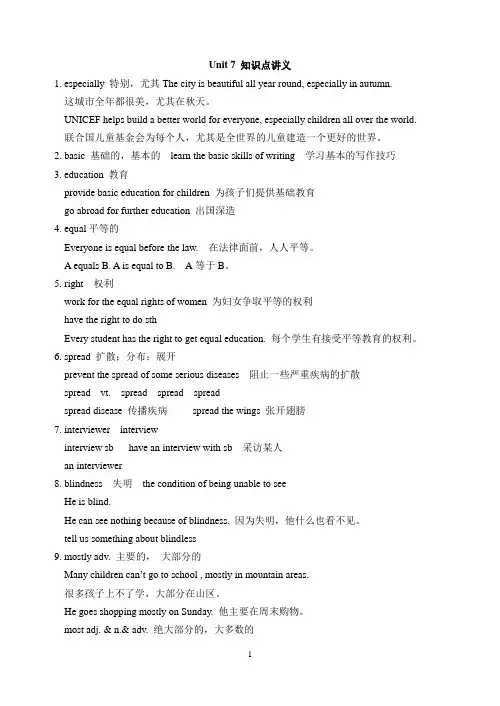
Unit 7 知识点讲义1. especially 特别,尤其The city is beautiful all year round, especially in autumn.这城市全年都很美,尤其在秋天。
UNICEF helps build a better world for everyone, especially children all over the world. 联合国儿童基金会为每个人,尤其是全世界的儿童建造一个更好的世界。
2. basic 基础的,基本的learn the basic skills of writing 学习基本的写作技巧3. education 教育provide basic education for children 为孩子们提供基础教育go abroad for further education 出国深造4. equal平等的Everyone is equal before the law. 在法律面前,人人平等。
A equals B. A is equal to B. A等于B。
5. right 权利work for the equal rights of women 为妇女争取平等的权利have the right to do sthEvery student has the right to get equal education. 每个学生有接受平等教育的权利。
6. spread 扩散;分布;展开prevent the spread of some serious diseases 阻止一些严重疾病的扩散spread vt. spread spread spreadspread disease 传播疾病spread the wings 张开翅膀7. interviewer interviewinterview sb have an interview with sb 采访某人an interviewer8. blindness 失明the condition of being unable to seeHe is blind.He can see nothing because of blindness. 因为失明,他什么也看不见。
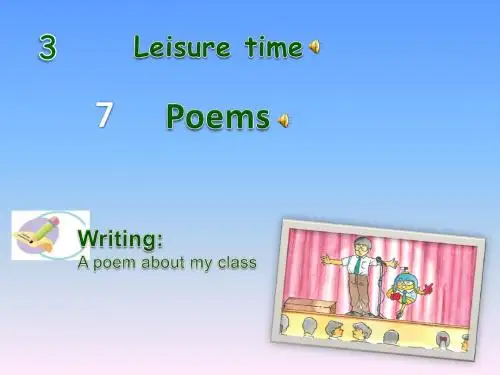
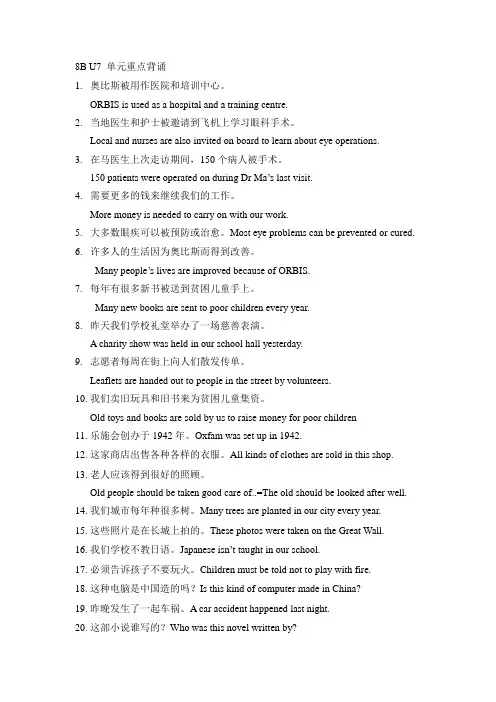
8B U7 单元重点背诵1.奥比斯被用作医院和培训中心。
ORBIS is used as a hospital and a training centre.2.当地医生和护士被邀请到飞机上学习眼科手术。
Local and nurses are also invited on board to learn about eye operations.3.在马医生上次走访期间,150个病人被手术。
150 patients were operated on during Dr Ma’s last visit.4.需要更多的钱来继续我们的工作。
More money is needed to carry on with our work.5.大多数眼疾可以被预防或治愈。
Most eye problems can be prevented or cured.6.许多人的生活因为奥比斯而得到改善。
Many people’s lives are improved because of ORBIS.7.每年有很多新书被送到贫困儿童手上。
Many new books are sent to poor children every year.8.昨天我们学校礼堂举办了一场慈善表演。
A charity show was held in our school hall yesterday.9.志愿者每周在街上向人们散发传单。
Leaflets are handed out to people in the street by volunteers.10.我们卖旧玩具和旧书来为贫困儿童集资。
Old toys and books are sold by us to raise money for poor children11.乐施会创办于1942年。
Oxfam was set up in 1942.12.这家商店出售各种各样的衣服。
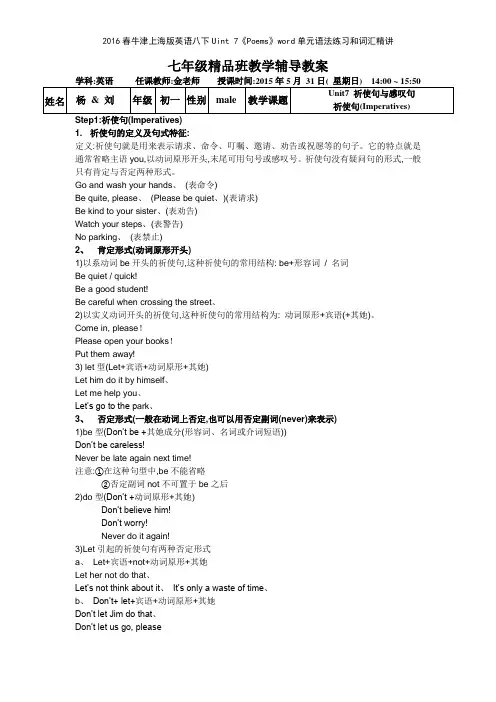
七年级精品班教学辅导教案Step1:祈使句(Imperatives)1. 祈使句的定义及句式特征:定义:祈使句就是用来表示请求、命令、叮嘱、邀请、劝告或祝愿等的句子。
它的特点就是通常省略主语you,以动词原形开头,末尾可用句号或感叹号。
祈使句没有疑问句的形式,一般只有肯定与否定两种形式。
Go and wash your hands、(表命令)Be quite, please、(Please be quiet、)(表请求)Be kind to your sister、(表劝告)Watch your steps、(表警告)No parking、(表禁止)2、肯定形式(动词原形开头)1)以系动词be开头的祈使句,这种祈使句的常用结构: be+形容词/ 名词Be quiet / quick!Be a good student!Be careful when crossing the street、2)以实义动词开头的祈使句,这种祈使句的常用结构为: 动词原形+宾语(+其她)。
Come in, please!Please open your books!Put them away!3) let型(Let+宾语+动词原形+其她)Let him do it by himself、Let me help you、Let’s go to the p ark、3、否定形式(一般在动词上否定,也可以用否定副词(never)来表示)1)be型(Don’t be +其她成分(形容词、名词或介词短语))Don’t be careless!Never be late again next time!注意:①在这种句型中,be不能省略②否定副词not不可置于be之后2)do型(Don’t +动词原形+其她)Don’t believe him!Don’t worry!Never do it again!3)Let引起的祈使句有两种否定形式a、Let+宾语+not+动词原形+其她Let her not do that、Let’s not think about it、It’s only a waste of time、b、Don’t+ let+宾语+动词原形+其她Don’t let Jim do that、Don’t let us go, please4) 在公共场合的提示语中,否定祈使句常用“No+名词/ V-ing形式”结构,表示“禁止做某事”。
牛津上海版英语八下Uint 7《Poems》单元说课稿一. 教材分析《Poems》是牛津上海版英语八年级下册的单元主题,本单元围绕着诗歌展开,让学生通过学习不同类型的诗歌,了解诗歌的特点和魅力,提高学生的文学素养。
教材中包含了不同类型的诗歌,如抒情诗、叙事诗、儿童诗等,每首诗歌都有其独特的风格和情感表达。
通过对这些诗歌的学习,学生可以了解到诗歌的形式美和内容美,提高自己对文学的鉴赏能力。
二. 学情分析学生在进入八年级下册时,已经对英语有了较深入的了解,具备了一定的英语听说读写能力。
但是,对于诗歌这一文学形式,部分学生可能还比较陌生,对诗歌的特点和鉴赏方法还不够了解。
因此,在教学过程中,需要注重引导学生了解诗歌的特点,培养他们的文学鉴赏能力。
三. 说教学目标1.知识目标:通过学习本单元的诗歌,使学生掌握诗歌的基本特点和鉴赏方法,提高学生的文学素养。
2.能力目标:培养学生阅读、理解和欣赏诗歌的能力,提高学生的英语表达能力。
3.情感目标:激发学生对诗歌的兴趣,培养他们热爱文学、追求美的情感。
四. 说教学重难点1.教学重点:诗歌的特点和鉴赏方法。
2.教学难点:诗歌的情感理解和表达。
五. 说教学方法与手段1.教学方法:采用任务型教学法、情境教学法和启发式教学法,引导学生主动探究、积极参与。
2.教学手段:利用多媒体课件、诗歌朗诵、小组讨论等手段,提高教学效果。
六. 说教学过程1.导入:通过播放一首优美的诗歌朗诵,引导学生进入诗歌的学习氛围。
2.新课导入:介绍本单元的学习主题——诗歌,让学生了解诗歌的基本特点和分类。
3.课文学习:让学生自读课文,引导学生关注诗歌的形式美和内容美,通过讲解和讨论,使学生掌握诗歌的鉴赏方法。
4.实践活动:分组让学生创作一首诗歌,培养学生的创造力和表达能力。
5.课堂总结:对本节课的学习内容进行总结,强调诗歌的特点和鉴赏方法。
6.作业布置:让学生选取一首喜欢的诗歌,进行鉴赏和分析,准备下一节课的交流分享。
牛津上海版英语八年级下册《Unit 7 Poems》说课稿2一. 教材分析牛津上海版英语八年级下册《Unit 7 Poems》是一篇关于诗歌单元的教学内容。
本单元共包含4篇诗歌,分别是美国诗人穆罕默德·阿里(Muhammad Ali)的《我如果必须告诉你》,英国诗人威廉·布莱克(William Blake)的《天真的话》,美国诗人玛雅·安吉洛(Maya Angelou)的《希望》以及中国诗人徐志摩的《再别康桥》。
通过对这些诗歌的学习,学生可以了解不同文化背景下的诗歌创作,提高自己的审美情趣和文学素养。
二. 学情分析在进入八年级下册的英语学习阶段,学生们已经掌握了一定的英语基础知识,具备一定的听、说、读、写能力。
然而,在诗歌方面,大部分学生可能较为陌生,对诗歌的韵律、节奏、修辞手法等特点了解不多。
因此,在教学过程中,需要关注学生的学习需求,循序渐进地引导他们走进诗歌的世界,感受诗歌的魅力。
三. 说教学目标1.知识目标:让学生掌握本单元4篇诗歌的基本内容,了解诗人及其作品背景,认识不同文化背景下的诗歌创作。
2.能力目标:培养学生欣赏诗歌、感受诗歌韵律和节奏的能力,提高学生的文学素养。
3.情感目标:激发学生对诗歌的兴趣,培养他们热爱文学、追求美的情怀。
四. 说教学重难点1.教学重点:让学生理解和欣赏诗歌的韵律、节奏和修辞手法,提高他们的文学鉴赏能力。
2.教学难点:引导学生深入理解诗歌背后的文化内涵,感受不同文化间的差异。
五. 说教学方法与手段1.教学方法:采用启发式、讨论式、互动式等教学方法,激发学生的学习兴趣,提高他们的参与度。
2.教学手段:利用多媒体课件、网络资源等手段,为学生提供丰富的学习资源,增强课堂教学的趣味性。
六. 说教学过程1.导入:通过播放一首轻松愉快的诗歌,引导学生进入诗歌的学习氛围,激发他们的学习兴趣。
2.诗歌欣赏:让学生自主阅读本单元的第一首诗歌《我如果必须告诉你》,感受诗歌的韵律和节奏,体会诗歌的美。
上海版牛津英语8B 第七章学习辅导材料学习新词语pleased adj. 高兴的;满意的例如:The teacher was very pleased to see his students again after being away from them for forty years. 老师在四十年以后和他的学生们重逢,非常高兴。
【词组】:be pleased with (对……)感到高兴,满意例如:My father is always not pleased with my grade at school.我父亲一直对我在学校的成绩不满意。
Everybody in his family seems to be pleased with the new house.他家每一个人看起来对新房子都很满意。
accept v.收受;接受;同意例如:I’ve received a gift from him, but I’m not going to accept it.我收到了他送的礼物,但是我不准备接受。
【词义辨析】:accept, receive1. accept 意思是“接受”,指经过思考,由主观意志决定接受,动作者本身是主动的。
例如:He couldn’t accept our suggestions but our gifts.他不能接受我们的建议,但接受了我们的礼品。
2. receive 意思是:“接到”,指收到某物这一动作,本身有一定的被动性,不包含本身是否愿意接受的意思。
例如:He did not receive a good education at university. 他没有受过良好的大学教育。
【同根词】:acceptor n.领受人;接受者acceptance n. 接受,承诺,赞同acceptable adj.可接受的【反义词】:reject v. 拒绝接受例如:The army doctors rejected him, would not accept him as medically fit.军医们拒绝接收他,认为他身体不合格。
第 1 页 8B Unit 7 Poems P109 1. recite v. 背诵—recitation n. 背诵;朗诵 2. poem n. 诗歌---two poems—poet n. 诗人 one of the most famous poets 最著名的诗歌之一 3. All right. =OK 好吧 That’s all right. 没关系。 You’re right. 你是对的;你说得对。 That’s right. 那是对的。 4. sometimes 有时;时而 =from time to time =at times =now and then 5. some times 几次 e.g. I have been to Garden City some times. 我去过花园城几次。 6. sometime 某个时候 e.g. sometime next week 下个礼拜的某一个时候 sometime last month 上个月的某个时候 sometime this year 今年的某个时候 7. some time 一段时间 经常用在for,after后 e.g. I stayed there for some time. 我在那里待了一段时间。 After some time, the baby stopped crying. 过了些时候,那个婴儿不哭了。 8. wonder v./ n. 想知道;奇迹—wonderful a. 精彩的;美妙的—wonderfully adv. wonder v. =want to know seven wonders of the world 世界七大奇迹 9. call me Hi 叫我Hi;把我叫做Hi He is called Hi. 他被叫做Hi. A man called John called you just now. 一个名叫约翰的人刚才打电话给你了。 10. He would like to know. =He wants to know. 他想知道。 11. I would like to know why they didn’t call me Lo. (宾语从句中的从句用陈述的语序) P110 1. poetry n. 意思也是“诗”,但为诗的总称,是不可数名词 poem为可数名词,可指具体的一首诗、两首诗、几首诗 2. on the Internet 在因特网上 3. difficult a. =hard =not easy 困难的---difficulty n. (difficulties) have difficulty in doing sth. 在做某事方面有困难 4. must 应该;必须;一定 mustn’t 不准;不能 5. rhyme n. 节奏;韵律;押韵词--- rhymes 6. poems about our feelings and ideas 关于我们情感和思想的诗歌 7. the answer/ key to the question 这个问题的答案 8. taste n. 滋味;风味 taste v. 品尝;风味(连系动词后+形容词)--tasty a. 美味的;有品味的=delicious 9. not … at all 一点儿也不;根本不 e.g. I don’t like spicy food at all. 我一点儿也不喜欢辛辣食品。 10. smell n. 嗅觉;气味 v. 闻起来 (连系动词+形容词) 连系动词:look, smell, taste, sound, feel, become, turn, get, grow 11. waterfall 瀑布 pump 水泵 a well 一口井 P111 1. be at work 在上班 2. have/ take a shower 淋浴 have/ take a bath 盆浴;泡澡 3. have/ eat dinner 吃晚饭 eat—ate—eaten 4. sit v.—sat—sat—seat 座位—sitting sitting room 起居室;客厅= living room 5. read a newspaper 看报纸 two newspapers 两份报纸 read—read—read—reader 读者 6. watch television 看电视 watch too much television =watch television for too long 看电视太久=watch too many TV programs 7. go to bed 去睡觉;就寝 go to sleep 入睡;睡着= fall asleep 8. boring a. 无趣的;单调的;乏味的= uninteresting= dull 9. on the building site 在建筑工地上 10. high up 离地面高的;高高在上的 He’s high up in the clouds. 他高高地站在云里 11. cloud(s) n. 云—cloudy a. 多云的 wind n.—windy a. sun n.—sunny a. rainy; snowy;foggy 表示天气的形容词:一般+y 问天气: What’s the weather like? =How is the weather? 12. fix v. =repair =mend 修理 13. crane n. 起重机;吊车;鹤 fix a crane 修理吊车 14. so 如此;这么;那么;因此;所以 so little/ few very little/ few (so,very后跟否定词) 15. clever a. =bright =smart =intelligent =wise 聪明的 16. a narrow plank 窄的板条 walk on a narrow plank 走在狭窄的板条上 17. narrow a. —narrower—narrowest 狭窄的 18. scared a. 害怕的;恐惧的= frightened =afraid ---scare v. 使害怕,使恐惧---scary a. 吓人的=frightening e.g. He is not scared. Don’t scare me. a scary moment 吓人的一刻 19. verse(s) n. 诗节 20. on one’s own =by oneself =alone 独立的;靠自己 e.g. Finish your homework on your own. 独立完成作业。 21. be pleased with…对…满意= be satisfied with pleased a. =happy =delighted = satisfied 高兴;满意 22. please v. 请;使高兴—pleased a. 感到高兴的;满意的—pleasant a. 令人愉快的;宜人的 —pleasure n. 快乐 23. talk about 谈论 talk to/ with sb. 跟某人谈话 24. cross a. 恼怒的;坏脾气的= angry= annoyed v. 横跨;穿越 n. 十字架 get cross 发火 be cross with sb. 对某人生气---crossly adv. 恼怒地;生气地 25. cross the road = go / walk across the road 穿过马路 26. silence n. =be quiet 安静---silent a. 沉默的;无声的;寂静的 keep silent 保持沉默 第 2 页
27. pay attention 注意 attention n. 注意力;立正 Can I have your attention please? 请注意听我讲话好吗? pay attention to sth. 注意某事/ 某物 28. scold v. 训斥;责骂—scolded—scolded 29. put them in detention 罚他们留堂;让他们放学后留下 30. in every way 在各方面;以各种方式 31. chat v. 闲聊;聊天—chatting love chatting with her class 喜欢和她的学生一起聊天 32. seem like 好像 33. It seems that+句子= Sb./ Sth. seems to do… 看起来;似乎 e.g. It seems that no one knows what has happened in the park.= No one seems to know what has happened in the park. 似乎没有人知道在公园里发生了什么事。 34. puzzle v. 使迷惑;使困惑---puzzled a. 感到困惑的---puzzling a. 令人困惑的 e.g. Her voice sounded puzzled. 她的声音听起来很困惑。 His answer was puzzling. 他的回答令人困惑。 n. 智力玩具 do puzzles v. 拼拼图;玩智力玩具 Joe likes doing puzzles. 乔喜欢拼拼图。 35. explain v. 解释;说明;讲解---explanation n. explain to sb. e.g. Don’t explain it to me. I don’t want to listen to your explanation. no explanation 没有解释 36. staff n. 全体职员(是复数名词) 37. real a. 真的—really adv.—realize v. 意识到;实现 P113 1. look up a new word in a dictionary 在字典中查找一个生词 2. make sure 确定;确保;务必 3. be sure 确信;对……有把握 4. look for 寻找 find—found—found 找到;发现 find out 找出;查明;弄清 5. breathe v. 呼吸 breathe in 吸入(气体) breathe out 呼出(气体) breath n. 呼吸 take a deep breath 深呼吸 be out of breath 上气不接下气;喘不过气来 hold one’s breath 屏住某人的呼吸 enjoy breathing pure, cool air 喜欢呼吸洁净凉爽的空气 6. pretend v. 假装 pretend to do sth. 假装做某事 P114 1. author =writer n. 作者 2. score n./ v. 得分 3. introduce v. 介绍—introduction n. Let me introduce myself to you. 让我做自我介绍。 P115 1. marry v. 结婚;嫁 marry sb. 与某人结婚;嫁给某人 be married to…与某人结婚 2. wife n. 妻子---wives pl. (以“f”、“fe”结尾的名词的复数,去“f”、“fe”+ves) e.g. knife—knives wolf—wolves 3. some information much information What useful information it is! 4. cousin n. 堂、表兄妹 P116 1. repeat v. 重复 2. speak v.—spoke—spoken—speech n. 演讲;发言 make a speech 3. a tape recorder 一个(磁带)录音机 4. an electronic dictionary 一个电子词典—dictionaries 5. a pair of scissors 一把剪刀 6. a driving licence 一本驾照 7. an electronic calculator 一个电子计算器 an electronic mail 一封电子邮件 8. The dictionary is mine. =The dictionary belongs to me. 9. report sth. to sb. 向某人汇报某事---reporter n. 记者 10. drive v. 驾驶;驱动---drove—driven---driver n. 司机 11. an accountant 一个会计 12. a hairdresser 理发师 P117 1. the Li family= the Lis 姓李的一家 2. opposite our school 在我们学校的对面 3. instead of 代替;而不是(通常“做某事,不做某事”这样的两个句子可以用instead of连成一句。) e.g. We went to the beach. We didn’t go to the cinema.--We went to the beach instead of going to the cinema. 我们去了海滩而没有去看电影。 4. 替代词one和ones的用法: one只能代替单数名词(可数名词)。 e.g. I don’t like this cup. I like the blue one. ones替代复数名词。 e.g. Do you want the red apples or the green ones? 5. freeze v. 使结冰---froze---frozen ◆frozen a. 冷藏的;结冰的;惊呆的 frozen ground 结冰的地面 frozen food 冷冻食品 ◆freezing a. 严寒的;极冷的 in freezing weather 在极冷的天气里 6. a loaf of bread 一条面包 two loaves of bread 7. pork chops(带骨)猪排 8. sausage(s) 香肠 9. a plastic cup 一个塑料杯 P118 1. This is Penny. / This is Penny speaking. 我是潘尼。(电话用语) 2. Who’s that?/ Who’s that calling? 你是谁;你是哪一位?(电话用语)